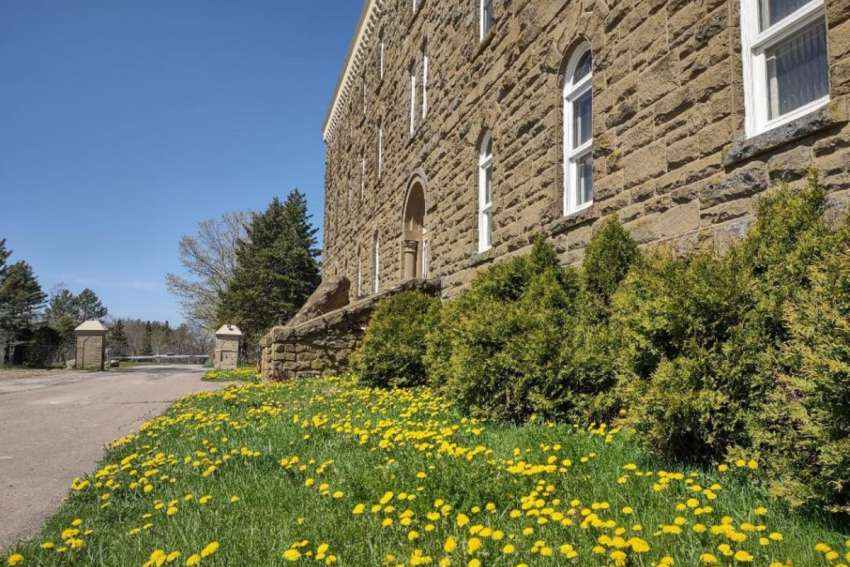The Cistercian monks arrived in 1902 at the invitation of local parish priest Fr. Marcel‑François Richard, who wanted to provide refuge for the brothers from the anti-cleric movement spreading throughout France.
At its peak around the 1970s and ‘80s, 30 religious brothers lived at the abbey. With the ranks dwindling to three, the Order of Cistercians of the Strict Observance’s (OCSO) Abbot General Dom Bernardus Peeters and his council in Rome voted on April 26 to close Our Lady of Calvary.
Two weeks later, the news was announced on the Archdiocese of Moncton website. Fr. Innocent Ugyeh, the monastery’s superior, wrote that while a commission works to “deal with the practicalities of closure,” he and his brothers “are still here, though, living our monastic life until all issues regarding this closure are resolved.”
Each day, the monks rise at 3:20 a.m. to begin their regimented timetable. They commence their devotional pursuits at 3:40 a.m. with a vigil service featuring hymns, psalms and readings. At 6:20 a.m., they congregate for a morning worship session (Lauds). At 8 a.m., the monks receive the Eucharist. Religious services are also hosted at 11:40 a.m. (Sext), 2 p.m., 5:15 p.m. (Vespers) and 7:20 p.m. (Compline). There are also several scheduled times for personal prayer and Scripture reading.
“It is a contemplative life, a cloistered life, a life lived in community with other brothers, and it’s an intense kind of life,” Ugyeh told The Catholic Register. “That holiness of life is the upstanding thing the monastery stands for.”
The major work period of the day is from 2:15 p.m. to 4:50 p.m. For over a century until its closure in 2018 due to financial challenges, the “Trappists” operated a renowned dairy farm. According to a CBC article published at teh time, Br. Stephan Hewitt managed the herd for the last 35 years the farm was active. He learned the names of all 90 milking cows, 80 heifers and calves in his care.
Though the dairy business was liquidated, the poultry farm, established in 1963, remains active today. During its long history, Our Lady of Calvary also managed a piggery, aviary, a cement block commercial production, a gristmill and even dabbled in making Monacad health products for a time. Dedicated “lay brother” employees instrumentally supported the monks’ varied agricultural pursuits.
Cistercian monks’ commitment to manual work stems from their adherence to the Rule of St. Benedict. The Rule decrees: “When they live by the labour of their hands, as our fathers and the apostles did, then they are really monks.” Each brother endeavours to make a contribution to the daily workload to the best of his ability. The staying power of Our Lady of Calvary was bolstered through the years by older monks striving to work for as long as possible.
Ugyeh said it is hard for him and his fellow Trappists to say goodbye to the abbey “because they love the place and their brothers so much.” Though paying the bills is doable, the father superior said it is not practical for the monastery to remain open when “there is no vocations and no recruitment,” which means it cannot be maintained “at the level we want” for the long term.
Considering Ugyeh is 57, he is poised to live a monastic life for many years. He could transfer to the Cistercian Abbaye Val Notre-Dame in St-Jean de Matha, Que., or perhaps to one of the 15 abbeys located in the United States. He is working to finalize placements for himself and his other brothers.
The Archdiocese of Moncton, which owns the property, will have to finalize what to do with Our Lady of Calvary once Ugyeh and the brothers depart.
The next step of the closing process, scaling back the number of days the general public can join the monks for Eucharistic celebrations, went into effect on June 1. The area’s MLA Kevin Arsenault and Rogersville Mayor Jimmy Bourque told media outlets that they hope the building can continue to serve the community. Arsenault mused that it could be used as a farm school.
Before the doors are closed, Archbishop Guy Desrochers and the Archdiocese of Moncton will salute the Trappists’ legacy with a special diocesan celebration. Planning for this special occasion is still underway, and a date is expected to be announced soon.


